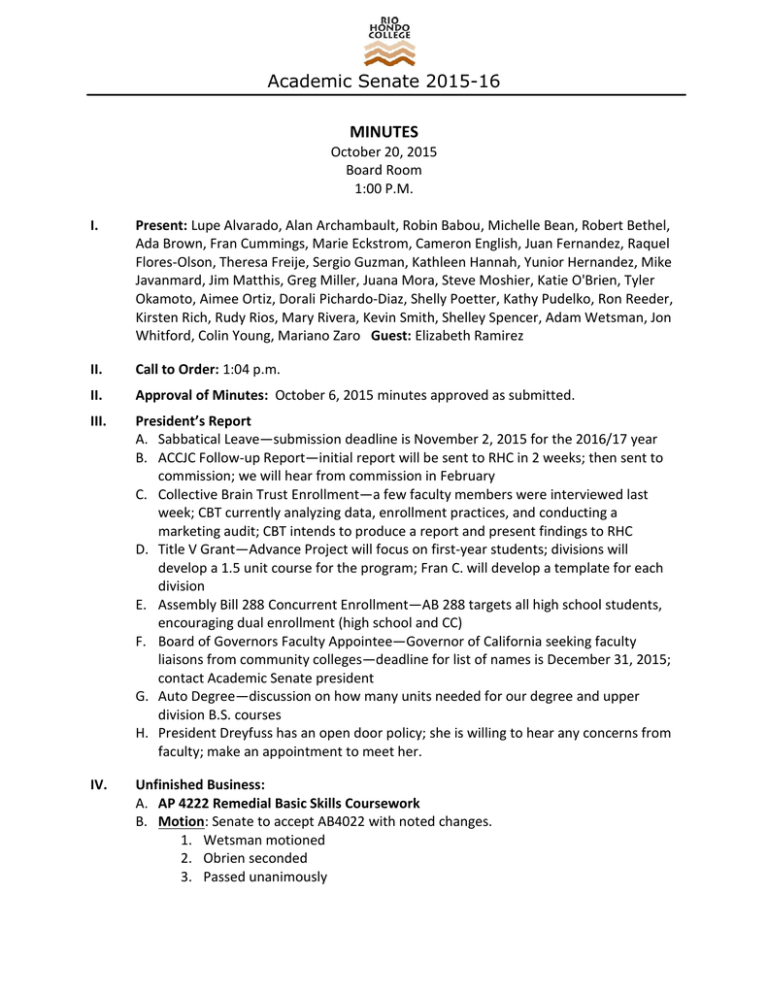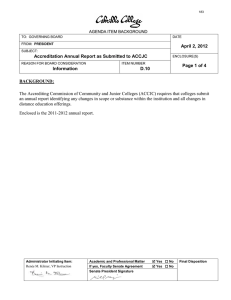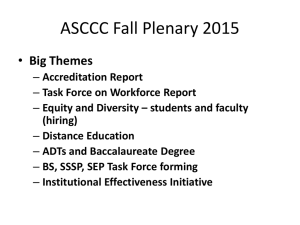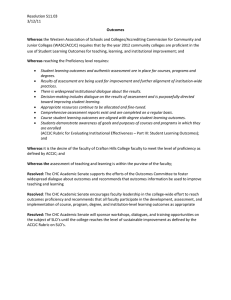MINUTES
advertisement

Academic Senate 2015-16 MINUTES October 20, 2015 Board Room 1:00 P.M. I. Present: Lupe Alvarado, Alan Archambault, Robin Babou, Michelle Bean, Robert Bethel, Ada Brown, Fran Cummings, Marie Eckstrom, Cameron English, Juan Fernandez, Raquel Flores-Olson, Theresa Freije, Sergio Guzman, Kathleen Hannah, Yunior Hernandez, Mike Javanmard, Jim Matthis, Greg Miller, Juana Mora, Steve Moshier, Katie O'Brien, Tyler Okamoto, Aimee Ortiz, Dorali Pichardo-Diaz, Shelly Poetter, Kathy Pudelko, Ron Reeder, Kirsten Rich, Rudy Rios, Mary Rivera, Kevin Smith, Shelley Spencer, Adam Wetsman, Jon Whitford, Colin Young, Mariano Zaro Guest: Elizabeth Ramirez II. Call to Order: 1:04 p.m. II. Approval of Minutes: October 6, 2015 minutes approved as submitted. III. President’s Report A. Sabbatical Leave—submission deadline is November 2, 2015 for the 2016/17 year B. ACCJC Follow-up Report—initial report will be sent to RHC in 2 weeks; then sent to commission; we will hear from commission in February C. Collective Brain Trust Enrollment—a few faculty members were interviewed last week; CBT currently analyzing data, enrollment practices, and conducting a marketing audit; CBT intends to produce a report and present findings to RHC D. Title V Grant—Advance Project will focus on first-year students; divisions will develop a 1.5 unit course for the program; Fran C. will develop a template for each division E. Assembly Bill 288 Concurrent Enrollment—AB 288 targets all high school students, encouraging dual enrollment (high school and CC) F. Board of Governors Faculty Appointee—Governor of California seeking faculty liaisons from community colleges—deadline for list of names is December 31, 2015; contact Academic Senate president G. Auto Degree—discussion on how many units needed for our degree and upper division B.S. courses H. President Dreyfuss has an open door policy; she is willing to hear any concerns from faculty; make an appointment to meet her. IV. Unfinished Business: A. AP 4222 Remedial Basic Skills Coursework B. Motion: Senate to accept AB4022 with noted changes. 1. Wetsman motioned 2. Obrien seconded 3. Passed unanimously Academic Senate 2015-16 V. New Business: A. Resolution of Support to Chancellor’s Office (ACCJC)—see Addendum B 1. Board of Governors reviewing Accreditation Task Force recommendation; seeking support from Academic Senate 2. Motion: To accept the recommendations of the Accreditation Task Force as proposed in the Academic Senate’s Resolution in Support of the Recommendations of the Chancellor’s Accreditation Task Force 2015 and to forward said resolution to Chancellor Harris a. Pudelko motioned b. Javanmard seconded c. Passed unanimously B. CTE Liaison Appointment 1. Motion: To support the appointment of John Frala as CTE liaison a. Javanmard motioned b. Reeder second c. Passed unanimously C. Adoption of Online Education Committee (OEC) Timeline—see Addendum A 1. Motion: To approve the OEC deadlines as noted in Addendum A timeline a. Javanmard motioned b. Young seconded c. Passed unanimously VI. Committee Reports A. Academic Rank—no report B. Basic Skills—more funding coming soon C. Bookstore—no report D. Curriculum—Oct 19 was the deadline for submissions E. FLEX/Staff Development—no report F. ITC –meeting 10/20/15 G. SLOs—keep doing course level SLO reports; need Program level SLOs now— please complete before March H. Student Equity—no official word yet on funding allocation; the committee will decide on funding requests I. OEC—now registered with Canvas; if you need assistance, contact Office of Online Education; a 24/7 Canvas helpline also available; online courses need regular and effective faculty contact J. IEC—no report K. Program Review—no report L. Safety—Drill on 10/21/15 M. MIS/Enterprise—no report Academic Senate 2015-16 VII. Announcements—Study Abroad teaching positions open—email Adam Wetsman VIII. Public Comment--none IX. Adjournment: 2:02 p.m. Academic Senate 2015-16 Addendum A In order to teach online in fall semesters, all faculty must have certification completed by April 30th of that year. In order to teach online in spring semesters, all faculty must have certification completed by September 30th of the previous year. In order to teach online in summer semesters, all faculty must have certification completed by February 28th of that year. Academic Senate 2015-16 Addendum B Resolution in Support of the Recommendations of the Chancellor’s Accreditation Task Force 2015 Whereas: The U.S. system of regional accreditation continues a long tradition of providing essential guarantees of quality in America’s post-secondary institutions; a spirit of collaboration and mutual respect between the regional commissions and their member institutions is essential to the success of the system of accreditation; and a shared focus on the needs and interests of students is primary and vital to preserve, and Whereas: Over the last decade, the relationship in the Western Region between the Accrediting Commission for Community and Junior Colleges (ACCJC) and California’s 112 community colleges has changed from one of constructive collegiality to one in which the member colleges increasingly report antagonism, intimidation and fear, and Whereas: The ACCJC levels sanctions against California community colleges at a rate that is 400% of the sanction levels seen in other regions and in four-year California institutions, Whereas: Concerns about the changed nature of the relationship between the ACCJC and many of its member institutions have been documented by resolutions, articles and complaints prepared and approved by leading statewide organizations of professional educators, including the Community College Council of the California Federation of Teachers (CCC-CFT), the Community College Association of the California Teachers Association (CCA-CTA), the California Community College Independents (CCCI), the Faculty Association of the California Community Colleges (FACCC) and the Academic Senate for the California Community Colleges (ASCCC), Whereas: Many Administrative, Trustee, Support Staff and Student Groups have joined faculty in expressing concern about the actions of the ACCJC, Whereas: The growing concerns regarding the ACCJC have led to a review of the ACCJC’s financial impact on community colleges by the CA Legislature’s Joint Legislative Audit Committee, creation of three separate Task Forces by the California State Chancellor’s office, filing of three lawsuits against the ACCJC, and multiple public statements of concern from members of California’s Congressional delegation as well as state legislators, and Whereas: The ACCJC’s frequent sanctions based on the legitimate activities of trustees of Community College District Boards have raised serious concerns regarding the free speech rights of elected officials and the rights of voters to representation by duly elected officials, and Academic Senate 2015-16 Whereas: Areas of non-compliance found during the ACCJC’s regular review by the U.S. Department of Education prompted the DOE to continue its recognition of the ACCJC as an accrediting body for only a one-year period -- in which it must demonstrate compliance -- instead of the standard five-year period for renewal of recognition, and Whereas: The 2015 Chancellor’s Accreditation Task Force Report has researched and reported on the actions of the ACCJC and has recommended unanimously that the Chancellor either pursue joining the Western Association of Schools and Colleges Senior College and University Commission or affiliating with another regional accreditor, Therefore Be it Resolved: That [Our Organization] hereby joins with our colleagues throughout the state to express deep concern over the adversarial relationships fostered by the ACCJC, which pose a threat to fair accreditation and access to public higher education in California, and Be it Further Resolved: That this body stands in strong support of the recommendations made by the Chancellor’s 2015 Accreditation Task Force Report and endorses a new model for accreditation, including options such as forming a combined single accrediting commission with community colleges joining WASC Senior College and University Commission, in keeping with the prevalent model for regional accreditation, or identifying other regional accreditors that could serve the California Community Colleges. Date ___________________________________________ Title Title Title


